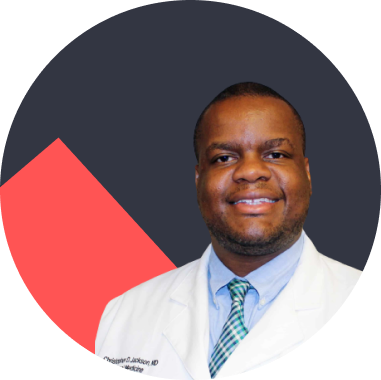Finding the Art in Medicine with
Dr. Christopher Jackson

A Conversation with Dr. Christopher Jackson
“Choose mentors that you are comfortable being vulnerable and honest with. The most rewarding thing as a mentor is being able to develop a pretty special bond with my mentees. And part of that bond is predicated on a safe environment where there is mutual respect and trust.”
Bio
Christopher Jackson, MD, is an Assistant Professor of Medicine in the Department of Medicine at the University of Tennessee Health Sciences Center. He is passionate about resident education and is the Associate Program Director for Curriculum and Education in the Internal Medicine Program and also is part of medical student education as the Assistant Clerkship Director for Internal Medicine. Dr. Jackson is part of the core faculty of the Center for Health System Improvement. He is the recipient of many awards and recognitions, including the Doctor Gibbons Outstanding Residents in Endocrinology Award, the Arthur Investigator Award for Research, and he has multiple publications in many high impact journals. His research interests include evidence-based practice, clinical reasoning, and the use of podcasts in graduate medical education.
How have you used innovation, including podcasting, to improve your student’s education?
“I think part of my interest in doing innovation in medical education is my own journey. When I was a resident, I was always told If you wanted to get better, you needed to just read more. If you read one more PubMed article or if you read one more page in your MKSAP that this was one of the keys to acquiring this knowledge that seemed so mysterious that all of my attendings had.”
However, as Dr. Jackson continued to read, he was often left with a question. “I often wondered, ‘Wow do you sustain this?’” His perspective shifted when he talked to one of his colleagues one day who mentioned to Dr. Jackson that he should start listening to podcasts. Prior to this point, podcasts were not high on Dr. Jackson’s personal radar. But he decided to give them a try.
He downloaded an episode of The Curbsiders Podcast and was immediately captivated. He realized a good podcast creator could take a topic and discuss it in such a way that was two to three times more effective than if the listener had researched the material on their own.
This prompted him to then begin using podcasts to introduce topics to residents. And in doing so, Dr. Jackson found a way to bridge the gap between knowledge and application. He was able to help students take knowledge and apply it to real life clinical scenarios.
What were some of the major turning points in your life?
“Probably the first turning point I can think of actually goes all the way back to high school. Originally, I didn’t plan to do medicine as my career. I actually thought I was going to be a professional musician. I applied to go to music school and started the auditioning process.”
Despite the fact that things were going well, Dr. Jackson still felt a tug to combine his love for science and art. “While music certainly fulfilled the art side, the science side of me was not fulfilled. And that actually pushed me towards medicine.”
As Dr. Jackson indicated, his career path was not a linear one, prompting him to make this keen observation: “If you look at most successful people, all of them will probably share some story that their past was not linear, that they did have moments along the way where they had epiphanies or turning points that pushed them to where they wanted to go.” This observation was a critical turning point in his life.
Dr. Jackson’s second turning point came in medical school. Up until that point, he was used to being the star student, always getting top notch grades. “And then all of a sudden, now I’m in medical school with everybody else that was at the top of their class, and everybody else that is quite smart and there can be some intimidation that comes with that.”
As he neared the end of his first year, his studies took him into a brain and behavior module. For the first time in his life, he found himself struggling academically. At that point, he discovered the importance of persistence. He understood the value of showing up day after day and leaning on those around him for support.
How have you balanced the arts with the science that most of us associate with medicine?
“I think the experiences with my patients have reminded me so much of the art,” Dr. Jackson reflected. “My first foray into the art of medicine actually goes back to one of the first patients I ever saw in family medicine. She was a patient that dealt with a lot of medical issues, probably a predominant medical issue was anorexia. And she’d been to multiple doctors. She always talked about how nobody seemed to take her seriously and how everybody was just focused on medicalizing everything that occurred with her.”
“I remember walking into her room while I was in my clinic, and we just had a conversation. I put the science to the side and I kind of just looked and said, ‘Well, if I were in her shoes, how do I take away all the medicalizing and see her as a person?’”
“I learned that she was a teacher and that one of her greatest passions in life were the students that she had. I learned that she had dealt with multiple challenges that included anxiety. And by the time we finished that conversation she had smiled for the first time in that clinic that my family medicine preceptors saw.”
This interaction led one of Dr. Jackson’s colleagues to remark, “If you can do that with every patient, then you have figured out what the art of medicine is!” As Dr. Jackson notes, “The art is being creative in how we engage with our patients and establish that therapeutic relationship so that we can partner together toward shared goals.”
What would you say are the key traits and habits of the most successful and most fulfilled physicians in training?
“It’s okay to not know,” is the first thing Dr. Jackson mentioned. “I still tell patients every single day I don’t know something. But it’s very important to match that with something. ‘I don’t know what’s the cause of this particular symptom or problem you’re having, but I will earnestly work to figure it out, to the best of my ability.’”
There is a sharp difference between these two approaches. As Dr. Jackson points out, “One kind of tells the patient, ‘Oh, well, the doctor doesn’t know, and I guess they don’t care. And I’m just going to have this problem for forever.’” Another says, ‘I acknowledge you have this problem. I acknowledge that it has a significant impact on your life and I am going to do my best to figure out what is going on.’”
“Always to be humble enough to say, ‘I don’t know.’”
Pearls of Wisdom
- Don’t be concerned if your path is not linear. Continue to focus on finding meaning and purpose; rather than hitting linear goals.
- Medicine is not just science. And as physicians, we are not just scientists—we are also artists. And the greatest opportunity lies in the patient encounter. Look deeper into your patient’s social history to find areas where you can connect and bond—this will create stepping stones for trust.
- Be humble. It’s perfectly okay to admit when you don’t know something. The real growth occurs when you make the commitment to figure out what you don’t know. This will earn you more trust with the patient, as well.
